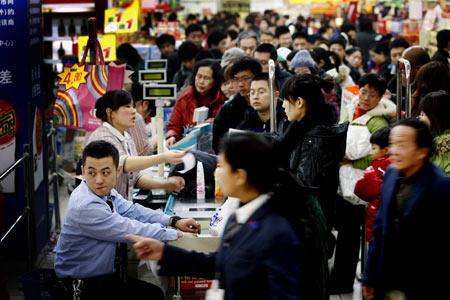
Customers line up to pay for goods at a supermarket in Beijing. The city's retail business is increasing as Spring Festival approaches. [Mirror Evening News]
Another wave of high-end international stores will set up shop in Beijing this year as the capital continues its campaign to become one of the world's top cities.Beijing aimed to introduce six more elite retailers and 40 percent of the world's luxury brands will have a presence in the city, a senior commerce official said.
Among 280 first-class international retailers, 101 are already in Beijing and more are on the way.
"Beijing is the most open city on the Chinese mainland when it comes to the retail industry," said Lu Yan, director of Beijing municipal commission of commerce.
The move is being seen as part of the city's ambitious plan to make it into what the mayor has described as a "world city". The aspiration gathered momentum when Forbes magazine ranked it as one of the 15 worlds' shopping capitals. It was also ranked one of the eight world's best cities to eat well.
Beijing's total retail sales in consumer goods reached 531 billion yuan in 2009, up 15.7 percent on a year earlier.
Chaoyang district and Haidian district were the areas where most of the money was spent, with both seeing retail sales of more than 100 billion yuan.
"Consumption has played a dominant role in driving the capital's economic recovery, which contributed a lot to Beijing's GDP growth last year," Cheng Hong, Beijing's vice-mayor, said at a work conference yesterday.
The Swedish fashion retailer Hennes & Mauritz AB (H&M), opened its first store in March and by the end of 2009 had five stores in Beijing.
Wu Shuang, public relations manager of H&M China, said sales were good.
"I can't release the sales from Beijing alone but the total sales of our 27 branches in China last year was 1.6 billion Swedish kronor ($219 million), which is very positive," Wang told METRO yesterday.
ZARA, from Spain, another fashion giant, also expanded to eight stores in 2009.
Meggie Qin, head of research at Jones Lang LaSalle, said the impact of the financial crisis meant luxury brands slowed their pace of expansion in the first three quarters of 2009, but they increased activity in the fourth quarter.
"Luxury brands, such as Giorgio Armani and Gianni Versace, have already rented space for stores in Beijing's Sanlitun," Qin said in an interview last month.
Zeng Ziluo, a 21-year-old student at Beijing Foreign Studies University, said she liked shops such as H&M, because they offer customers fashionable clothes at a fair price.





